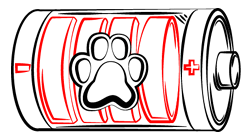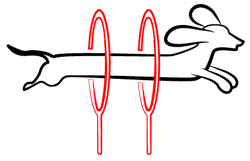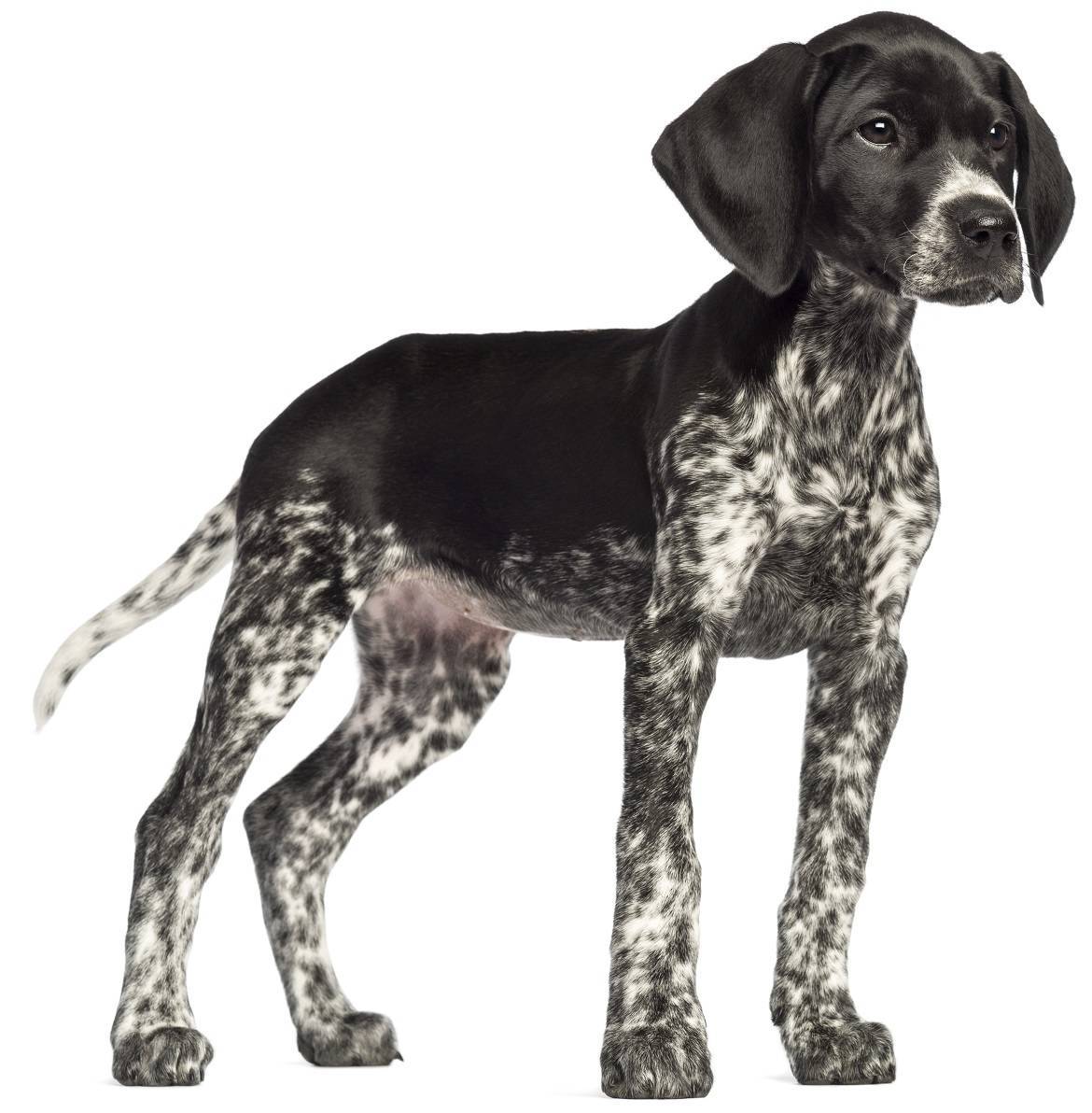
Paws ‘N’ Pups Quickview
Size
| Energy Level
| Trainability
| Paws ‘N’ Pups Rank
|
Characteristics
| Physical Characteristics: Height – Female: 21-23” | Male: 23-25” Weight: 45-70 lbs. Energy Level: High | Colors: The American Kennel Club recognizes the German Shorthaired Pointer in the following colors:
|
Health & Longevity
Average Life Span: 12-14 years
Curious and boisterous, the German Shorthaired Pointer is one of the most popular dog breeds for hunters. These pups boast mostly good health throughout the lives, but there are a few minor and serious health concerns that pet owners should be aware of. German Shorthaired Pointers can develop breed-specific health problems, but they are also prone to health conditions that any dog of any breed can suffer from, such as heartworms and obesity.
Most health issues that can become prevalent in the German Shorthaired Pointer begin with a change of attitude in your pup. Followed by physical symptoms, such as weakness, lack of appetite, and loss of interest in exercise and other playful activities. If you notice a drastic shift in the mood of your pup, take him to the vet immediately for a thorough, possibly life-saving examination.
Lymphedema
Watery and dangerous, this condition occurs when fluid becomes trapped in the lower extremities, resulting in severe, painful swelling. The condition is a symptom in and of itself, so vet-prescribed medications and antibiotics are recommended. Other symptoms include lethargy, weakness, loss of appetite, hair loss, severe weight loss, and rapid mood swings. Sometimes surgery is required to alleviate the swelling and return extremities to regular sizes.
Other health conditions that your German Shorthaired Pointer could develop include hip dysplasia, bloat, hypothyroidism, Von Willebrand’s Disease, entropion, and skin allergies. The average lifespan for a German Shorthaired Pointer is between 12 to 14 years.
Temperament & Train-ability
German Shorthaired Pointers, also known as GSPs, are rambunctious, bouncy, and energetic, thriving with plenty of companionship, affection, and love. These pups practically overflow with energy, making them perfect for fitness-minded folks who want a running partner that can keep up.
However, there are a few flipsides to their personality. Not necessarily downsides, but learning curves. For example, German Shorthaired Pointers are stubborn and independent, so you have to establish your role as alpha before you can properly train them. Another example would be their intolerance of inactivity. Since these pups are super-active, they get bored very easily, very quickly, which can lead to destructive behavior.
German Shorthaired Pointers, as mentioned, are very energetic dogs, so they need lots of time outdoors to romp and run and play. He loves to explore, chase, and dig, so a fenced-in backyard would be the ideal outlet for his excess energy. These pups were originally bred to chase and corner prey for hunters, so their nature demands they chase squirrels, chipmunks, and other small woodland animals. If socialized at a young age, the German Shorthaired Pointer would also do well at a dog park, playing with other energetic canines. Also, keep in mind that German Shorthaired Pointers are excellent jumpers, so make sure your purebred can’t leap over the fence in your backyard or at the dog park.
Training a German Shorthaired Pointers is more so for professional trainers because these pups bring a whole new level of stubborn. While they love making their owners happy, they also love doing what they want, when they want. If you opt to be the trainer, use a clear, strong tone in a positive, concise voice to repeat commands. Stick to your training sessions, and never show your frustrations.
Grooming
German Shorthaired Pointers boast a short, dense coat with lightweight, lengthy strands that fan around along their bottom and tail. Use a firm-bristled brush to groom your pup at least once a week. You might have to ramp up the brushing to 2-3 times per week in the summertime, as these purebreds are prone to moderate shedding in high heat.
Other basic care needs include trimming his toenails every 3-4 weeks, cleaning his ears every 6-7 days, brushing his teeth 4-5 times a week, and bathing him once a month.
Diet
Most German Shorthaired Pointers have high metabolisms, thanks to their extreme energies. On average, these pups need two meals per day, one in the morning and one before bed. Feed him 2 ½ to 3 cups of dry, high-quality kibble, divided into those two meals. Invest in a wholesome, hearty dog food, rich in protein, complex carbs, fiber, and good fats. Cheaper brands are often full of by-products, chemicals, and fillers. Avoid these and opt for brands that feature whole grains, lean meats, and veggies.
Looking for a German Shorthaired Pointer?
 Find A German Shorthaired Pointer Breeder |  German Shorthaired Pointer Puppies For Sale |  Adopt A German Shorthaired Pointer |
Cost
The German Shorthaired Pointer is a popular purebred choice for hunters, as these pups are quick, alert, and keen to chase and track other animals. Of course, there are fluctuations in their high-demand status, so breeders often change their average costs to match the breed market. On average, German Shorthaired Pointer puppies cost upwards of $650 from a reputable, reliable breeder. However, depending on their lineage and well-documented purebred bloodlines, an AKC-guaranteed German Shorthaired Pointer could cost as much as $1,500.
Unfortunately, some German Shorthaired Pointers are used for tracking and hunting, then abandoned at an animal shelter when their use has run its course. This kind of treatment is wrong, but it happens often. Before you invest in a trustworthy breeder, check your local animal shelter for German Shorthaired Pointers. Some of these pups are still looking for their happy, loving home, and you could give it to them. Adoption fees, while variant from county and state, usually run between $75 to $250. But vaccinations, spay or neuter services, and a health check will run the fee up to between $400 to $500.
Paws ‘N’ Pups Ranking
Paws ‘N’ Pups ranks every breed out of 4 with 1 being easiest to integrate into your life and 4 being the toughest – The lower the ranking the better.
Ranking takes into account a few basic factors including cost, skill level needed, high vs low maintenance and how critical regular training is to success. German Shorthaired Pointers are a 2.5 on the integration scale, due to their high-maintenance energy needs and training challenges. However, fitness-minded pet owners with the means to take their pup to a professional trainer are preferred. When trained, socialized, and exercised regularly, these canines can be well-rounded, well-behaved companions for a decade or longer.
Breeds Similar To German Shorthaired Pointer
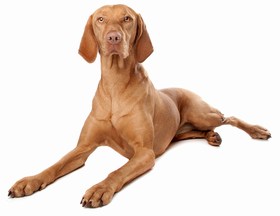 Vizsla | 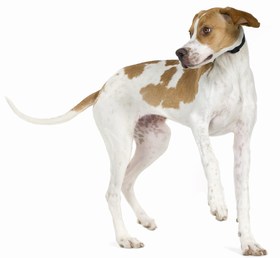 Pointer | 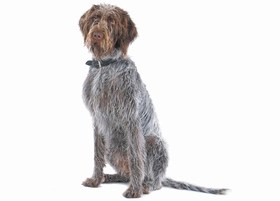 German Wirehaired Pointer | 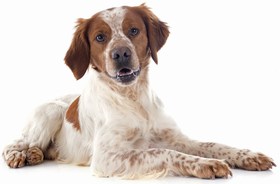 Brittany |


